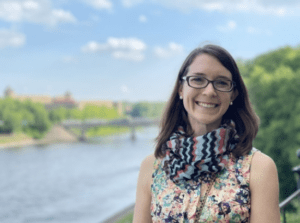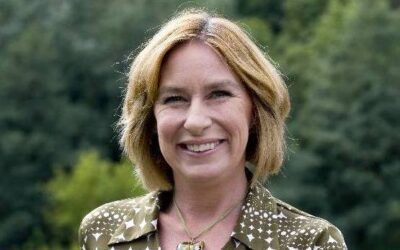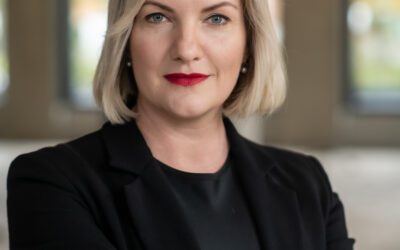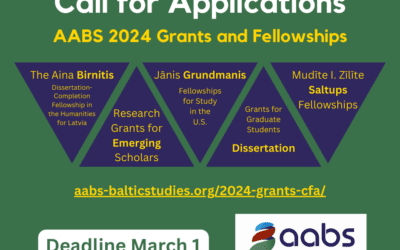AABS is pleased to recognize Heidi Erbsen for her completion of the project “More than just Movies: Baltic Language Learning Film Festival,” for which she received the Baumanis Grant for Creative Projects in Baltic Studies.
“More than just Movies” brought together teachers from Estonia, Latvia, and Lithuania to create a resource to help teach about the history, culture, and languages of the three Baltic countries through film. Please visit https://wocom360.wordpress.com/more-than-just-movies/ for the full collection.

©Heidi Erbsen, 2023
Heidi A. Erbsen is originally from Pearl City, Illinois, USA. In 2013 she earned her undergraduate degree in International Relations with a special focus on modern languages (Spanish and Russian) at Seton Hall University. Shortly after graduation, she moved to Russia to be an English teacher and was eventually awarded a Fulbright Scholarship to teach English in Russia in 2014-2015. Through a series of lucky encounters, she learned about the Estonian education system and came to Tartu in 2015 to complete her Masters in EU-Russia Studies. While she was studying at Tartu University, Heidi studied Estonian herself and worked as an English teacher at Tartu International School. Through this experience she noticed the unique opportunity to use films not only for enjoyment, but to learn about history, language, and culture. At the time of this project, she was completing her PhD in Media and Communications at Tartu University.
The Impact of an Award: Report from Heidi Erbsen
After the completion of “More than just Movies,” Heidi Erbsen submitted a reflection to AABS.
We thank her for her permission to publish her thoughts, which have been lightly edited.
Films are so much more than a simple form of entertainment: they are a mirror to, and reflection of, the way languages, cultures, history, and politics interact. Far too often, subtle historical reference, linguistic nuances, or political satire go unnoticed in films, and this proves especially true for films viewed by intercultural audiences. This project, funded by the Association for the Advancement of Baltic Studies (AABS) Baumanis Grant for creative projects, integrates the entertainment of the film industry with historical and educational practices to promote Baltic language and cultures in various educational settings.
As the author of this project, I am a life-long language learner and English teacher who has always strived to find interesting ways to learn about and teach language and the culture that is imbedded in every act of communication. Together with the Estonian Film Museum, the Riga Film Museum and two independent scholars (Kristina Tamelytė and Paulina Budrutė), I have compiled this book of resources to help teach about the history, culture, and languages of the three Baltic countries through film. The educational resource includes lesson plans for 5 movies from Estonia, 10 from Latvia, and 3 from Lithuania which can be used in educational environments, public conferences of cultural events, and by independent learners to understand the languages and cultures more deeply.
The resources have been tested in international schools in Estonia and have proven to be adaptable to include students with mixed levels, including native speakers! The invitation is to use this resource to learn or relearn the context and look at how culture works in nuanced ways. While the project is primarily focused on providing an easy to use and interactive resource made by and for language and culture teachers, it is accessible for independent learners as well. This will not only encourage independent language learners, but with the use of films, promote the uniqueness of the Baltic languages and cultures in an audio-visual way.
For independent learners, this book is a valuable resource full of background information, vocabulary, and comprehension questions to help understand the most important points of these culturally significant films. Some of the activities suggest groupwork or discussion, but you can also branch out, be creative, and take inspiration to put what you have learned to use in different ways. For teachers, this resource is available for you to use, adapt, and be inspired by. The only request is that while using the resource, modified versions of it, or the lesson templates, some credit is giving to the project. Other than that, feel free to use and modify the materials and to create your own resources using the template on pages 8-10. If you make your own materials, please share them so other teachers and learners can benefit from your hard work! For universities, centers, associations, and other organizations that host conferences or cultural events, follow copyright guidelines for showing these films and modify the material to make efficient use of time for the audience to provide a form of entertainment or platform for discussion. Being able to provide background material and interactive vocabulary and discussion questions, along with resources for similar movies, will keep participants of these events engaged and allow individuals to share resources through their personal networks as well. Please also share credit with the project and its content creators.
As the author, I believe this book of resources and project is a valuable and sustainable tool for making the cultural, linguistic, historical, and political aspects of the Baltic countries more accessible through film. Although the resources here do not come close to covering all cultural films in these countries, we hope it is a good start and provides some added inspiration to keep learning about and sharing culture in unique and interactive ways.
The full resource can be seen online at: https://wocom360.wordpress.com/more-than-just-movies/
Happy Watching!
– Heidi A. Erbsen
Heidi A. Erbsen
What is the Baumanis Grant?
The Baumanis Grant is an award made to honor Velta Marija Baumanis of Mount Brydges, Ontario, who left a generous bequest to AABS at the end of her career as an architect. An award of up to $7,000 is available for any creative project (e.g., book, film, exhibit, etc.) that promotes Baltic studies. Preference is given to topics with a pan-Baltic or comparative aspect. Applicants must be members of the AABS at the time of application.
Applications for the past cycle were evaluated by the AABS 2021-2022 Grants and Awards Committee consisting of AABS VP for Professional Development Dr. Ineta Dabašinskienė, AABS President Dr. Daunis Auers, AABS Director-at-Large Dr. Andres Kasekamp, and AABS Treasurer Ugis Sprūdžs, CFA.
Other Grants and Fellowships News
Vanished Lands: Book Publication Subvention Report by Laima Vincė Sruoginis
The Association for the Advancement of Baltic Studies (AABS) is pleased to recognized the successful conclusion of a Book Publication Subvention Grant awarded to Peter Lang Publishers for publishing the book Vanished Lands: Memory and Postmemory in North American...
Elīna Vikmane Birnitis Fellowship Report on Advancing Cybermuseology
AABS is pleased to recognize Elīna Vikmane for the completion of her dissertation "Advancing Cybermuseology: Diffusion of digital innovation in Latvia’s museum sector," for which she received the 2022–2023 Aina Birnitis Dissertation-Completion Fellowship in the...
AABS 2024 Grant and Fellowship Applications Open
Call for Applications AABS 2024-2025 Grants and Fellowships Research Grants for Emerging Scholars The Aina Birnitis Dissertation-Completion Fellowship in the Humanities for Latvia Mudīte I. Zīlīte Saltups Fellowships Jānis Grundmanis Fellowships for...



